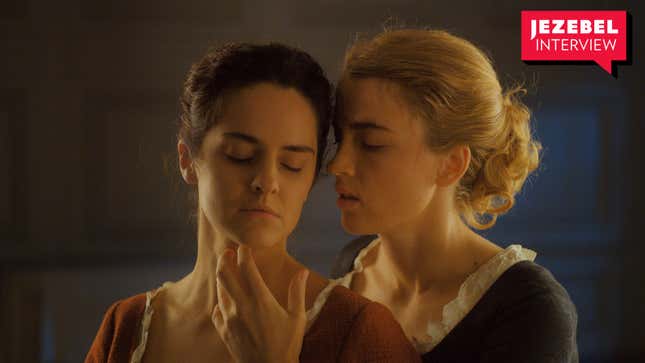Portrait of a Lady on Fire's Stars on the Film's Ethical Love Scenes
Entertainment
Image: Neon
It’s almost shocking to see Noémie Merlant and Adèle Haenel in a modern setting and contemporary fashion. They disappear so much into the characters they play in Portrait of a Lady on Fire and the world they inhabit—a brief but idyllic love affair in 18th century France—that reality is jarring in contrast. (It’s kind of like when you started seeing Downton Abbey’s actors in other roles.) This is not to erase their past acting accomplishments, just to note how indelible their work in Céline Sciamma’s polemic romance is.
A follow-up to our interview with the film’s writer-director, Jezebel talked to its stars, both French, about finding their characters’ love on screen. We met in person in late September while they were in town to present their movie at the New York Film Festival. Merlant was, like her painter character Marianne, somewhat reserved, while Haenel, who plays Héloïse, the unbeknown subject of Marianne, was intense. “Sex scenes are violent for actresses, and this time it was not,” Haenel told me. She explains why in the interview below, which is edited and condensed.
JEZEBEL: What do you make of the rapturous response this movie has received?
NOÉMIE HAENEL: We did the movie we wanted to do, first. We did it very sincerely and with a lot of imagination—everything that creates a piece of art.
ADÈLE MERLANT: We were so excited to do this because it’s a love story, but there are so many things in it that we wanted to share, that Céline wanted to share that I think are really important. To see that people connect with us, with the film, it’s so warm.
Haenel: It’s a new proposal of love that is usually not portrayed, a proposition with a lot of equality in it. It shows the sexiness of equality, the sexiness of consent. I think we need it. As artists, we have the responsibility to offer new stories for people to live. The major story about a successful life is about possession. It’s about having your wife, your dog, your house. I think it’s not enough. We need different stories. We need for people to think about their life in a different way, having other expectations. I think this is why the response to the movie is very strong: We offered a new possibility. Love, which is not only about the possession of somebody or sadness. You can create with somebody and love this person and the fact that it has an end doesn’t mean the feeling itself is dead. The journey of the feeling continues in you. You will become somebody more alive; you will have higher expectations in life.
It shows the sexiness of equality, the sexiness of consent.
Merlant: It’s another vision, another angle. The woman’s vision. We don’t have enough of that.
Is that one of the things you referred to as wanting to share with the world?
-

-

-

-

-

-

-

-

-

-

-

-

-

-

-

-

-

-

-

-

-

-

-

-

-

-

-

-

-

-

-

-

-

-

-

-

-

-

-

-








































